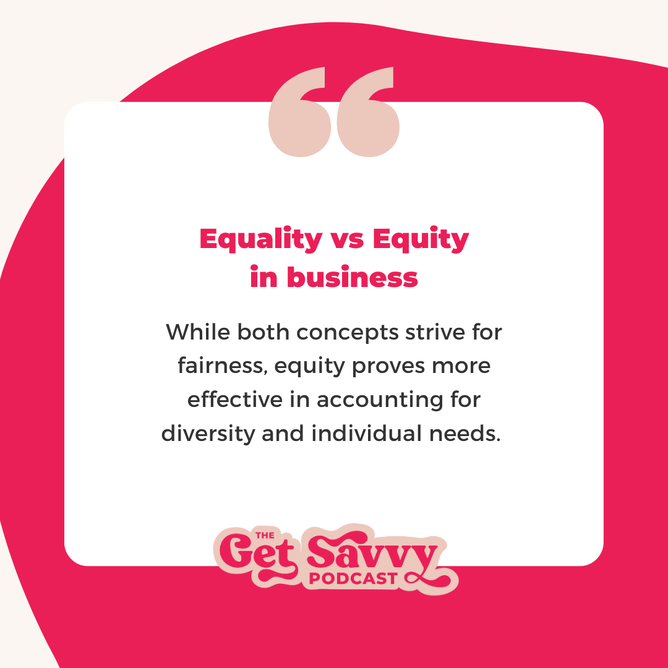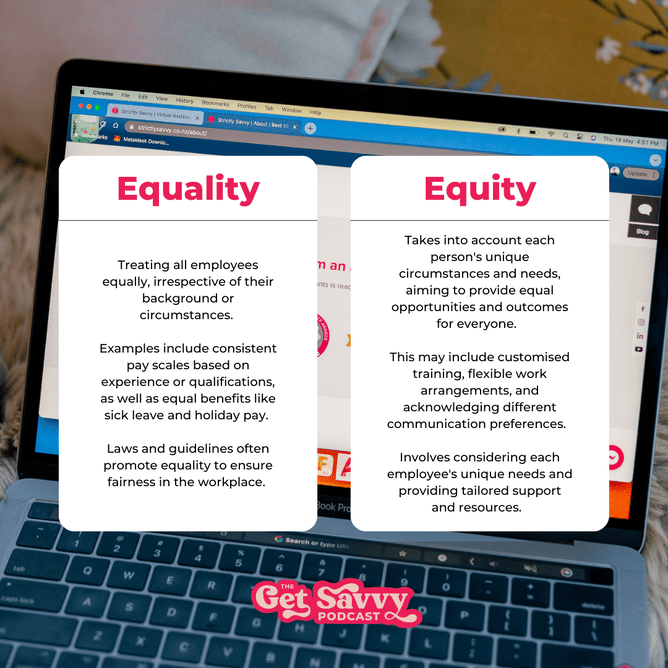On Episode 14 of the Get Savvy Podcast, we're joined by a very special guest, Cathy from BSI People Skills.
Cathy is the CEO and Founder of BSI People Skills, a leadership coaching organisation that helps businesses understand their people through the power of tools such as Everything DiSC personality profiles.
With a wealth of knowledge and experience, both nationally and internationally, Cathy's expertise transcends cultural bounds, making her an expert in people and their relationships.
She has a passion for empowering her clients and igniting leadership at every level of organisations.
Today we're discussing the very important topic of Equality vs Equity, lead by Cathy.
Understanding Equality and Equity
Equality and equity are interconnected concepts, although they differ in their approach.
Equality focuses on treating everyone the same, ensuring fairness regardless of individual differences.
On the other hand, equity aims to provide resources tailored to each person's unique circumstances, enabling equal opportunities and outcomes.
While both concepts strive for fairness, equity proves more effective in accounting for diversity and individual needs.
Prioritising equity helps businesses retain employees by making them feel valued and motivated to perform their best.
A workplace that embraces diversity and equity reaps numerous benefits as teams capitalise on the unique strengths and skills of each member.
Equality in the Workplace
Workplace equality entails treating all employees equally, irrespective of their background or circumstances.
Examples include consistent pay scales based on experience or qualifications, as well as equal benefits like sick leave and holiday pay.
Laws and guidelines often promote equality to ensure fairness in the workplace.
Drawbacks of Solely Focusing on Equality in Business
While workplace equality is important, it can have downsides.
Concentrating solely on equality may result in issues such as pay inequity in industries traditionally dominated by women.
It is essential to consider each individual's unique skills and backgrounds, evaluating whether treating everyone the same is genuinely fair and just.
Equity in the Workplace
Equity in the workplace takes into account each person's unique circumstances and needs, aiming to provide equal opportunities and outcomes for everyone.
By acknowledging and addressing these differences, businesses can foster an inclusive and supportive environment, enabling all employees to reach their full potential.
Achieving workplace equity involves considering each employee's unique needs and providing tailored support and resources.
This may include customised training, accommodations, flexible work arrangements, and acknowledging different communication preferences.
For instance, businesses in New Zealand accommodate employees with impairments or disabilities, creating an inclusive environment that allows everyone to perform at their best.
Small businesses can establish a strong equity foundation early on, while larger organisations should maintain open communication and ensure that all leaders actively promote equity.
Equality vs. Equity: Real-Life Examples
Understanding the distinction between equal and equitable opportunities helps businesses create an inclusive and supportive work environment. Let's consider a lighthearted example:
Equal Opportunity: Same Presents for All
An example of equal opportunity would be giving the same birthday present, like a facial treatment, to every team member.
However, this approach fails to consider individual preferences and needs. Some employees may not enjoy facials or may prefer not to be touched.
Equitable Opportunity: Tailored Presents for Each Employee
In contrast, an equitable approach involves considering each person's preferences and needs when selecting their birthday present.
By allocating a specific budget for each gift, employers can ensure that everyone receives a personalized present that truly reflects their interests and desires
Global Perspectives on Equality and Equity
Insights gathered from individuals worldwide reveal diverse experiences with equality and equity in their countries and workplaces.
For example, a Sri Lankan man highlighted the absence of both equality and equity in their business system.
Similarly, a Canadian individual mentioned the challenges faced by employees with disabilities, where limited growth opportunities and confinement to specific roles hindered their full potential, reflecting tokenism.
Equity of Outcomes
Another concern related to equity is the concept of "equity of outcomes," which seeks to ensure that everyone produces the same outcome.
However, this approach can create a dystopian scenario where individuals are intentionally held back instead of helping them rise and reach their full potential in their unique situations.
The Importance of Genuine Care and Intention
Creating an equitable work environment begins with genuinely caring about each team member and listening to their needs and concerns.
Fostering a culture of curiosity, empathy, and open communication helps build a diverse and equitable workplace where everyone feels valued and supported.
Genuine intentions in focusing on diversity and equity lead to strong, diverse teams contributing to the organisation's success. Actively listening to employees and demonstrating a genuine interest in their well-being creates an inclusive environment.
Addressing workplace equity is challenging yet essential for a thriving and inclusive work environment.
As a leader, it is crucial to continuously learn about yourself and your team members, emphasising the human aspect that connects everyone.
By keeping people at the forefront of business decisions and maintaining open communication channels, organisations can build strong and diverse teams that contribute to their success.
Visit BSI People Skills
Listen to the Get Savvy podcast on Spotify
Listen to the Get Savvy podcast on Apple Podcasts



